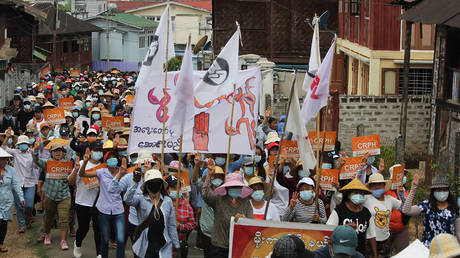
Myanmar’s military, which seized power on February 1, has claimed the anti-coup unrest has lost momentum. The protests, marred by a mounting civilian death toll, have nonetheless continued almost daily for over two months.
The protests have dwindled recently, military spokesman Brigadier General Zaw Min Tun told a news conference on Friday, providing an explanation for the presumed drop in protest activity.
“The reason of reducing protests is due to the cooperation of people who want peace, which we value,” the spokesman said. “We request people to cooperate with security forces and help them.”
Despite the military’s assessment of the situation, the anti-coup protests have been going strong across Myanmar. At least 11 people were reported killed and further 20 injured on Thursday during clashes in the northern town of Taze, when the military tried to disperse protesters there.
The violence continued throughout Friday as security forces pushed forward with a heavy-handed crackdown on protesters. In Yangon, the country’s largest city, a major police force assaulted a compound occupied by protesters, footage circulating online shows.
A major operation by the security forces was also reported in the city of Bago, located some 90 kilometers north of Yangon. Local media said the security forces used “heavy weapons” against a protesters’ encampment, while imagery circulating online showed fragments of mortar shells allegedly recovered from the scene.
More than 600 people have been killed during the two-month turmoil, according to estimates by the Assistance Association for Political Prisoners (AAPP) advocacy group. The military has provided its own tally, which turned out to be significantly lower. According to figures voiced by Zaw Min Tun, 248 protesters and 16 policemen have been killed during the unrest.
The military also provided the first timeframe for the return to civilian rule since it ousted the government in February, detaining Myanmar’s elected leader Aung San Suu Kyi and other officials. The politician has remained in custody ever since, facing assorted charges, ranging from illegal electronics-smuggling to bribery.
After the coup, the military announced a one-year period of emergency, vaguely promising to surrender power back to civilians at some point in the future. Now, the military said it would hold elections within two years and then hand over power to the elected government.
Think your friends would be interested? Share this story!




